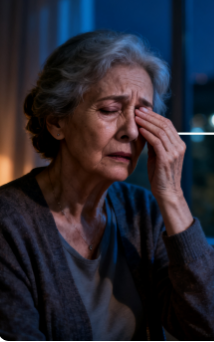
Your Night Vision Loss Is a Medical Emergency—Here’s Why You Can’t Ignore It
Imagine this: You’re walking to your car after dinner at your favorite neighborhood diner. Last week, you could easily spot the sidewalk crack and parking lot curb. But tonight, everything beyond the streetlight is a blurry, shadowy mess. You stumble, squinting—why can’t you see like you used to after dark?
If this sounds familiar, you’re not alone. Millions of Americans over 50 notice night vision changes, and it’s tempting to dismiss it as “just aging.” But sudden or worsening trouble seeing at night isn’t normal. It’s a red flag for serious health issues needing immediate care. Let’s break down why it’s an emergency, what causes it, and what to do next.
“I Just Need Brighter Lights”—Why That’s a Dangerous Mistake
Ed, a 67-year-old retired Ohio teacher, thought his night vision troubles were no big deal. “I turned on every light after sunset and avoided driving post-7 p.m.,” he says. “I figured my eyes were just tired.” That changed when he tripped over his mailbox, broke his wrist, and learned he had glaucoma—the night vision loss was an early warning. “I waited six months to get checked,” Ed admits. “Now I’m on daily drops to save my vision.”
Ed’s story is common because older adults normalize vision changes. But night vision depends on the cornea, lens, and retina—especially retinal “rods” that work in low light. Aging slows rods gradually, but sudden blurriness, slow dark adaptation, or halos around lights? That’s a problem.
Dr. Maria Sanchez, a Miami geriatric ophthalmologist, puts it plainly: “Night vision loss is your body yelling, ‘Something’s wrong.’ Ignoring it is like ignoring a smoke alarm for a ‘low battery.’”
The Surprising Culprits Behind Night Vision Trouble
Night vision loss always signals an underlying issue—eye-related or systemic. Here are the key causes:
1. Glaucoma: The “Silent Thief of Sight”
A top cause of blindness over 60, glaucoma occurs when eye fluid builds up, damaging the optic nerve that carries retinal signals to the brain. Night vision loss is often first. “Patients only notice trouble seeing at night or in rain,” Dr. Sanchez explains. “By daytime blurriness or pain, damage is permanent.”
2. Diabetic Retinopathy: A Blood Sugar Warning
For diabetics, high blood sugar damages retinal blood vessels—they leak or grow abnormally, scarring the retina and killing light-sensitive rods. Jim, 72, a Texas type 2 diabetic, couldn’t see his grandchildren at evening parties. “I blamed my glasses,” he says. “But my retina was bleeding from unmanaged sugar. With better control and laser treatment, my vision stabilized.”
3. Cataracts: More Than Cloudy Vision
Cataracts (clouded lenses) scatter light instead of focusing it, ruining night vision—plus glare from headlights and blurred street signs. Unlike glaucoma, surgery (America’s most common safe procedure) fixes it. “A patient crashed into a stop sign driving with cataracts,” Dr. Sanchez recalls. “Surgery takes 15 minutes, and most see better the next day.”
4. Vitamin Deficiencies: Easy Fixes
Vitamin A (for retinal rods) and B12 (for optic nerve health) deficiencies cause night vision loss. Older adults absorb less, and drugs like acid reflux meds block B12. A blood test detects levels; supplements or foods (leafy greens, eggs, fortified cereals) fix it.
5. Other Health Threats
High blood pressure damages retinal vessels like diabetes. Autoimmune diseases (lupus) attack eye tissue. Rarely, it signals stroke from reduced brain blood flow.
What to Do When You Notice Changes
1. Schedule an Eye Exam—Today
Skip the annual wait. Call an ophthalmologist (medical doctor, not optometrist) and mention night vision loss. Tests include:
- Visual acuity: Reading a low-light eye chart.
- Tonometry: Checking eye pressure for glaucoma.
- Retinal exam: Inspecting the eye’s back for damage.
- Perimetry: Mapping vision for blind spots.
2. Tell Them Everything
Be specific: When did symptoms start? Worse in rain or indoors? Any headaches, eye pain, or floaters? List all meds and health issues—even unrelated ones.
3. Stay Safe While Waiting
- Avoid night driving, especially in bad weather.
- Use motion-sensor outdoor lights and indoor nightlights.
- Wear non-slip shoes to prevent falls.
- Ask for help with evening tasks (trash, groceries).
4. Follow Treatment
Stick to prescriptions, follow-ups, and lifestyle changes (sugar control, supplements). Early intervention works: glaucoma with drops, retinopathy with laser, cataracts with surgery.
Myths About Night Vision Loss—Busted
Myth 1: “It’s Just Aging—I Can’t Help It”
Fact: Normal aging means slower dark adaptation, but sudden loss is treatable.
Myth 2: “Dim Light Reading Causes It”
Fact: It strains eyes but doesn’t damage rods.
Myth 3: “Eye Exercises Fix It”
Fact: They ease strain but won’t reverse glaucoma or cataracts.
Myth 4: “Only Bad Eyesight Gets This”
Fact: Even non-glasses wearers get it from glaucoma or deficiencies.
The Bottom Line: Act for Your Vision
Night vision loss isn’t just inconvenient—it’s dangerous: falls, crashes, missed health warnings. But it’s a warning, not a sentence. Quick action protects you.
Ed now attends his granddaughter’s evening soccer games. “I regret waiting,” he says. “Don’t make my mistake.” If you struggle to see after dark, call an eye doctor today. Your eyes—and future self—will thank you.